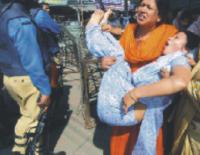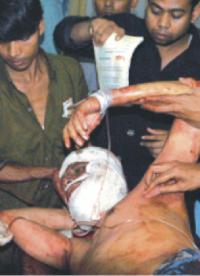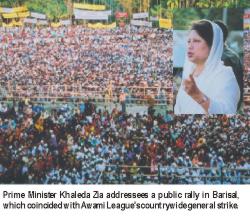Heading Towards a Crisis?
While
law and order is tittering on the brink of a total collapse,
the main opposition Bangladesh Awami League (AL) has been calling
one general strike after another. The ruling alliance, on the
other hand, seems to have vowed to take on the opposition in
the street. A war of words is waged between members of both
the parties; the absence of the main opposition has turned the
national parliament into a lame duck. The politics of confrontation
is back in business. The question people have been asking themselves
now is, are we heading towards a crisis?
Ahmede
Hussain
 It
was a fine mid-noon in Danik Bangla Mor. The area surrounding
the business district Mothijheel was unusually silent though,
because of a general strike called by the AL. But it did not
remain so for long. As soon as a procession led by AL leaders
Saber Hossain Chowdhury and Ahsanullah Master MP arrived, the
police, without any visible provocation started charging batons
on the gathering. Both the leaders sustained serious injuries
and were taken to hospital for treatment.
It
was a fine mid-noon in Danik Bangla Mor. The area surrounding
the business district Mothijheel was unusually silent though,
because of a general strike called by the AL. But it did not
remain so for long. As soon as a procession led by AL leaders
Saber Hossain Chowdhury and Ahsanullah Master MP arrived, the
police, without any visible provocation started charging batons
on the gathering. Both the leaders sustained serious injuries
and were taken to hospital for treatment.
Before this
incident on February 12, politics had remained in the back seat.
In fact, the AL had called the strike to realise its 15-point
demand, which included improvement of law and order and dissolution
of the Hawa Bhaban as the centre of power. What had driven the
government to go for such high-handed reaction is unclear. Actually
by attacking the opposition leaders, the Bangladesh Nationalist
Party (BNP) has played in the hands of the opposition. The AL
was looking for a reason for their cause. The BNP gave them
two.
The day
witnessed other incidents, too. In a public rally in Barisal
the prime minister (PM) accused the opposition of trying to
mar her "efforts to build the nation". What she has
meant by her efforts to build the nation is not clear though.
What we have seen is, during her term in office, goons belonging
to her and the opposition parties have been ruling the country
by proxy. Law and order has deteriorated so sharply that people
are unable to see any future, let alone the PMís efforts, if
at all there are any.
 Three
more strikes followed, and the fourth was observed on February
28. Meanwhile, the leader of the opposition has refused to talk
with the government to avert a crisis. Instead she wants immediate
resignation of the government followed by mid-term general elections.
"We want fresh elections immediately and we are ready for
it. Their days are numbered and their barbaric attacks on our
supporters during the recent hartals are but their last desperate
bit to cling to power," Sheikh Hasina says.
Three
more strikes followed, and the fourth was observed on February
28. Meanwhile, the leader of the opposition has refused to talk
with the government to avert a crisis. Instead she wants immediate
resignation of the government followed by mid-term general elections.
"We want fresh elections immediately and we are ready for
it. Their days are numbered and their barbaric attacks on our
supporters during the recent hartals are but their last desperate
bit to cling to power," Sheikh Hasina says.
Hasina and
her party have never accepted the result of the last general
elections, in which her party, after a full five-year term,
miserably failed to win even the expected number of seats. She
rejected the results and openly vowed to topple the government
whenever she got the chance. The AL boycotted the parliament
for about a year, later joined it; and later went back to the
street blaming the BNP's indifference to its demands. Before
the general elections in 2001she had promised not to call any
general strikes; but after nearly 2 years outside the helm,
she has either forgotten it, or is trying to tell us to try
to forget it.
 The
home minister (HM) has outlived nine lives. While the newspapers
are littered with news of rape and killing, the HM has constantly
been claiming normalcy. Not only that, when Saber and Ahsanullah
were injured, and the dailies carried photographs of the police
bashing up the opposition leaders, the HM denied any police
atrocity. "The Awami League leaders Saber Hossain Chowdhury
and Ahsanullah Master were not injured by police personnel,
rather they hurt themselves by falling on the road in a melee,"
Altaf Hossain Chowdhury told the parliament.
The
home minister (HM) has outlived nine lives. While the newspapers
are littered with news of rape and killing, the HM has constantly
been claiming normalcy. Not only that, when Saber and Ahsanullah
were injured, and the dailies carried photographs of the police
bashing up the opposition leaders, the HM denied any police
atrocity. "The Awami League leaders Saber Hossain Chowdhury
and Ahsanullah Master were not injured by police personnel,
rather they hurt themselves by falling on the road in a melee,"
Altaf Hossain Chowdhury told the parliament.
A lie begets
more lies; and the HMís untruths are no exception. When armed
BNP loyalists under the banner of Parbatya Sama Adhikar Andolon
attacked Gono Forum leader Dr Kamal Hossainís on his way to
the Chittagong Hill Tracts, the HM blamed it on the "armed
opposition activists accompanying Dr Kamal".
Lately the
armed insurgents in the south-west, like hooligans elsewhere
in the country, have been getting a free reign. The police,
along with the para-military Bangladesh Rifles, launched several
operations to improve the situation. But killings have not abated;
and now the police have come under attack. "Police officials
have been asked not to move alone while on duty and tight security
measures have been taken following directive by the district
superintendent of police," officer in charge of Sripur
and Shanikha police stations in Magura says, after Purba Banglar
Communist Party (Janajuddha) threatened to attack police stations
in the district. The sheer absence of the rule of law has made
businessmen toy with the idea of making their own private army;
some have already formed one.
People have
already started comparing Begum Khaleda Zia's second term in
office with the forlorn days of Bangabandhu Sheikh Mujibur Rahman.
Lawlessness is only the tip of the iceberg. Huge caches of arms
are being discovered almost at regular intervals, and in most
of the cases police have failed to nab the culprits.
Besides
law and order, the government has failed in several other sectors.
Members of the ruling party and its coalition partners can even
outmatch Awami League's last term in corruption and nepotism.
Prices of
essentials have been going up, and are getting far beyond people's
means. Sheer absence of the rule of law, coupled with corruption
and indifference, have made the country one of the most uninhabitable
places on earth.
 Though
the AL is demanding snap polls; the party, after a disastrous
general election, is yet to prove itself an alternative to the
Four-party Alliance. When democracy-- still wobbling on its
feet-- demands a strong parliament, the AL has been boycotting
it. In fact together with the ruling party, it has made it virtually
ineffective.
Though
the AL is demanding snap polls; the party, after a disastrous
general election, is yet to prove itself an alternative to the
Four-party Alliance. When democracy-- still wobbling on its
feet-- demands a strong parliament, the AL has been boycotting
it. In fact together with the ruling party, it has made it virtually
ineffective.
Without
making the ever-deteriorating law and order an issue, the party
is indiscriminately calling general strikes to bring down the
two-year-old-government. The AL has never been into constructive
criticism; instead it always opted for unconstitutional means
like street agitation and strikes to bring about a change.
Not only
that, the party has never formed a shadow cabinet or denounced
criminals within its rank and file. The AL, in fact, has never
apologised for its misrule during its last term in office. It
was only months ago, AL leader Tofail Ahmed told a meeting in
Feni that he had been missing Zoinal Hazari. The comment was
shocking, for Hazari and his armed group were infamous in the
area for killing and maiming innocent civilians, including journalists.
Hazari,
in fact, was not the only one. During its five-year rule several
gangsters, like Hazari, had worked under the shelter of the
AL administration; Abu Taher of Laxmipur and Shamim Osman of
Naryanganj to name only a few. It is clear from the AL presidium
member's comment that the AL has not shed that part of its character.
It is, indeed,
surprising that, the BNP, armed with an absolute majority, has
failed to live up to peopleís expectations. The AL's failure
to play the role of a strong opposition, together with the government's
failure, are giving birth to a looming disaster.

 It
was a fine mid-noon in Danik Bangla Mor. The area surrounding
the business district Mothijheel was unusually silent though,
because of a general strike called by the AL. But it did not
remain so for long. As soon as a procession led by AL leaders
Saber Hossain Chowdhury and Ahsanullah Master MP arrived, the
police, without any visible provocation started charging batons
on the gathering. Both the leaders sustained serious injuries
and were taken to hospital for treatment.
It
was a fine mid-noon in Danik Bangla Mor. The area surrounding
the business district Mothijheel was unusually silent though,
because of a general strike called by the AL. But it did not
remain so for long. As soon as a procession led by AL leaders
Saber Hossain Chowdhury and Ahsanullah Master MP arrived, the
police, without any visible provocation started charging batons
on the gathering. Both the leaders sustained serious injuries
and were taken to hospital for treatment.  Three
more strikes followed, and the fourth was observed on February
28. Meanwhile, the leader of the opposition has refused to talk
with the government to avert a crisis. Instead she wants immediate
resignation of the government followed by mid-term general elections.
"We want fresh elections immediately and we are ready for
it. Their days are numbered and their barbaric attacks on our
supporters during the recent hartals are but their last desperate
bit to cling to power," Sheikh Hasina says.
Three
more strikes followed, and the fourth was observed on February
28. Meanwhile, the leader of the opposition has refused to talk
with the government to avert a crisis. Instead she wants immediate
resignation of the government followed by mid-term general elections.
"We want fresh elections immediately and we are ready for
it. Their days are numbered and their barbaric attacks on our
supporters during the recent hartals are but their last desperate
bit to cling to power," Sheikh Hasina says.  The
home minister (HM) has outlived nine lives. While the newspapers
are littered with news of rape and killing, the HM has constantly
been claiming normalcy. Not only that, when Saber and Ahsanullah
were injured, and the dailies carried photographs of the police
bashing up the opposition leaders, the HM denied any police
atrocity. "The Awami League leaders Saber Hossain Chowdhury
and Ahsanullah Master were not injured by police personnel,
rather they hurt themselves by falling on the road in a melee,"
Altaf Hossain Chowdhury told the parliament.
The
home minister (HM) has outlived nine lives. While the newspapers
are littered with news of rape and killing, the HM has constantly
been claiming normalcy. Not only that, when Saber and Ahsanullah
were injured, and the dailies carried photographs of the police
bashing up the opposition leaders, the HM denied any police
atrocity. "The Awami League leaders Saber Hossain Chowdhury
and Ahsanullah Master were not injured by police personnel,
rather they hurt themselves by falling on the road in a melee,"
Altaf Hossain Chowdhury told the parliament.  Though
the AL is demanding snap polls; the party, after a disastrous
general election, is yet to prove itself an alternative to the
Four-party Alliance. When democracy-- still wobbling on its
feet-- demands a strong parliament, the AL has been boycotting
it. In fact together with the ruling party, it has made it virtually
ineffective.
Though
the AL is demanding snap polls; the party, after a disastrous
general election, is yet to prove itself an alternative to the
Four-party Alliance. When democracy-- still wobbling on its
feet-- demands a strong parliament, the AL has been boycotting
it. In fact together with the ruling party, it has made it virtually
ineffective.